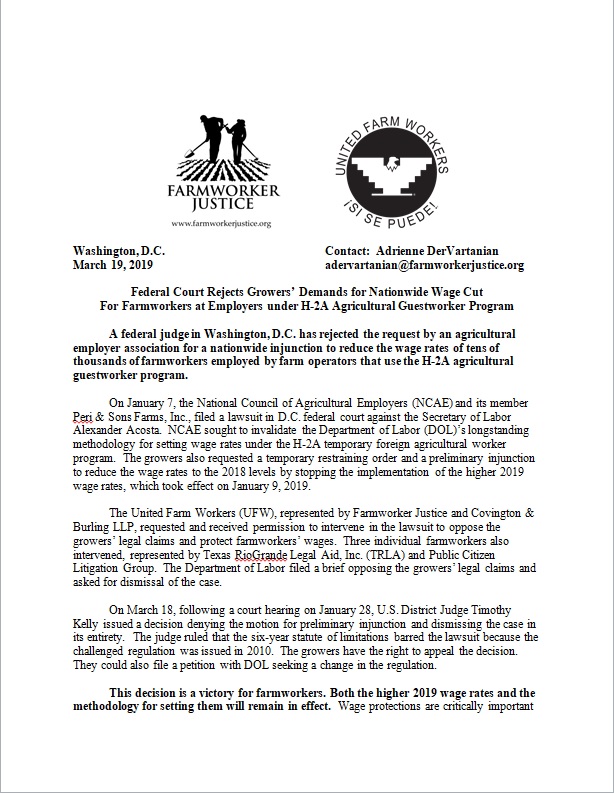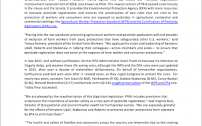For Release July 26, 2019 Contact: Adrienne DerVartanian
202-800-2522 adervartanian@farmworkerjustice.org
Trump Department of Labor Proposes Harmful Changes to H-2A Agricultural Guestworker Program
On July 26, 2019, the U.S. Department of Labor planned to publish proposed revisions in the H-2A agricultural guestworker program. The proposed changes appearing in the pre-publication release would make it even easier for agribusiness to hire hundreds of thousands of guestworkers, who are denied the rights and freedoms of immigrants and citizens. The public may comment on the proposed revisions for a 60 day period. The Labor Department will then review the comments and issue a final revision of the H-2A regulations.
The Trump Administration seeks to guarantee agribusiness unlimited access to a captive workforce that is deprived of economic bargaining power and the right to vote. The Administration would transform the farm labor force of roughly 2.4 million people into a workforce of 21st-century indentured servants. At the same time as this proposal, the Trump Administration is demonizing hard-working immigrants and ratcheting up cruel and counterproductive deportations, targeting many of our nation’s hard-working farmworkers.
The proposal likely will exacerbate existing problems in the H-2A program by, among other things, expanding the scope of the program, weakening recruitment protections, shifting more costs onto workers and reducing housing inspections. While the proposal contains a few modest improvements to the H-2A program, it fails to address many of the program’s failures and abuses, including rampant recruitment fees and exploitation, discrimination against U.S. workers in hiring, wage theft, unhealthy housing, unsafe working conditions and inadequate wage protections.
The pre-publication version of the proposed rule and the accompanying explanation are 489 pages long. We are reviewing the proposal and will be preparing a substantial analysis and formal comments.
The proposal would sharply reduce the obligation to recruit U.S. workers. Many H-2A employers prefer guestworkers over U.S. workers because H-2A workers are dependent on their employers for their ability to enter and work in the United States, and the fact that they are unable to seek out better wages or working conditions. Strong recruitment requirements are needed due to a long history of discrimination.
The proposal would shift H-2A program costs from employers onto the backs of H-2A workers, who are predominantly from poor countries. DOL proposes to reduce the employer’s reimbursement of the H-2A workers’ transportation costs. Rather than reimburse costs starting from the workers’ home communities where they are recruited, the employer could pay the travel costs starting from the U.S. consulate, which is often far from the workers’ homes. DOL calculates that during the next ten years, under this proposal, workers would lose, and employers would gain, $789.6 million, for an average of almost $80 million per year.
The rule proposes significant, complex changes to the wage rates required under the H-2A program for both U.S. and foreign workers. Under the H-2A program, wages must be at least the higher of: the local "prevailing wage for a particular job category;" the state or federal minimum wage; the agreed-upon collective bargaining rate; or the "adverse effect wage rate” (AEWR). The proposal includes changing the methodology for AEWRs, which are intended to ensure that the hiring of guestworkers does not undermine the wage standards for U.S. farmworkers by allowing employers to hire workers from high-poverty countries. DOL admits that its proposed formula would have resulted in lower wages in several major agricultural production states if it had been in force.
The rulemaking also includes changing the methodology for determining the prevailing wage in a way that would make it difficult to ensure a prevailing wage is even determined, resulting in large wage cuts for some farmworkers.
“The Trump Administration’s proposal would make it easier for farmers to bring in temporary foreign workers under substandard wages and working conditions, denying these valuable workers the economic and democratic freedoms on which this country is based,” said Bruce Goldstein, President of Farmworker Justice.
He added: “The Administration's immigration enforcement and threats against undocumented immigrants are harming farmworker families and undermining the agricultural sector, where a majority of workers are undocumented. The Trump Administration is doing nothing to deal responsibly with the most basic challenge: the majority of the current farm labor force is undocumented. Congress should grant undocumented farmworkers and their family members the opportunity for immigration status and a path to citizenship.”
The H-2A temporary foreign agricultural worker program, which originated during World War II, is intended to allow agricultural employers to hire foreign citizens on temporary work visas for temporary or seasonal agricultural work if they can demonstrate a shortage of labor and that the wages and working conditions will not “adversely affect” the wages and working conditions of U.S. workers. The H-2A program has been growing rapidly recently, from 139,832 jobs in 2015 to over 242,000 in 2018, undermining the argument that the program is too burdensome for employers.
Farmworker Justice is a national advocacy organization for farmworkers and has extensive experience regarding immigration policy, labor rights and the H-2A agricultural guestworker program. Our report, “No Way to Treat a Guest: Why the H-2A Agricultural Visa Program Fail U.S. and Foreign Workers” is available on our website.
###
Read moreTrump Department of Labor Proposes Harmful Changes to H-2A Agricultural Guestworker Program


